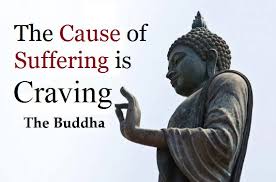Codependent Origination
 That is a term that has not come to mind for many years. The concept means causation. Nothing comes to be apart from depending on many other things. It is an important, often used word in Buddhist texts. The Buddhist tradition takes cause and effect with total seriousness, –as serious as a heart attack to put the matter bluntly. In the Buddhist concept of human experience you and I are caught in the whirl pool of attraction to all of the things that we find pleasant, and the repulsion from all the things that we dread. Some of these are known to us, but most are subconscious, beneath the surface of our awareness. And often attraction and dread are simultaneous, concurrent.
That is a term that has not come to mind for many years. The concept means causation. Nothing comes to be apart from depending on many other things. It is an important, often used word in Buddhist texts. The Buddhist tradition takes cause and effect with total seriousness, –as serious as a heart attack to put the matter bluntly. In the Buddhist concept of human experience you and I are caught in the whirl pool of attraction to all of the things that we find pleasant, and the repulsion from all the things that we dread. Some of these are known to us, but most are subconscious, beneath the surface of our awareness. And often attraction and dread are simultaneous, concurrent.
I suspect this bedevilment is what drives a large part of our economy. Much advertising is a pitch for something to stave off the inevitable consequences of aging. How many medications do we need to treat male impotency? And the question remains whether human sexuality is nothing but the mechanics?
We are wearied and harassed with a myriad of sales pitches for products to alleviate worry or satisfy desire that are nothing but the ephemeral fabrication of the story line of the ad man’s pitch. Can a new BMW really deliver all that the gleaming vehicle in the exciting photo montage suggests? Would my life be improved by taking on the lease, than by keeping my current paid-up vehicle?
 Our grandparents were not as addled, distracted with so much advertising. They had much less. Were they happier, more satisfied with their lot in life, modest though it was, by comparison to that of our own time?
Our grandparents were not as addled, distracted with so much advertising. They had much less. Were they happier, more satisfied with their lot in life, modest though it was, by comparison to that of our own time?
I do find the Buddhist offer of release/relief from psychological and spiritual entrapment by the context of our lives, —attractive.
There is a term for that state of being as well. Enlightenment is the word that usually comes to mind. Another expression which I like even better is: wisdom that passes over to the other shore. I can still remember how poetic the word sounds in the Sanskrit language of some of the ancient Buddhist texts. I was introduced to some of those texts many years ago when I studied for a while at Northwestern.
The word wisdom is: prajiña. The word for passing over is: paramita. Wisdom-that-passes-over sounds just perfect to me.
3 thoughts on “Codependent Origination”
Jerry, I fear that “Our grandparents […] were happier, more satisfied with their lot in life” uses the identical logic of “Make America Great Again!” Both assume that long-ago human experience — the day-to-day details of which are conveniently inaccessible — was overall better than the obviously imperfect here-and-now, rather than just better in some specifics.
Another way to look at it is that our grandparents indeed were pitched snake oil just as we are. But since the pitches were so much less frequent, our grandparents’ defenses against them were not so well-developed as ours, so they may have been taken in by pitches more easily than we are.
You are absolutely on target to say that we do not have access to the lives of others, and their victories and defeats of a past time. And since you made the point I am struck that happiness is a general term so that is impossible to compare between one’s contemporaries. Some who have appeared to be very unhappy have made astonishing contributions and asserted that they had lived a happy life, at the close of their tenure here. Wittgenstein is who I have in mind
And yes, Trumpian logic seems absurd to me.
Yes grandparents were pitched much less of everything including snake oil by comparison to our own time. I do not think that the defenses of the people around me are well developed. A lot of people seem oblivious to how they are being massaged by advertising. It makes sense to me why we have the President that we now have.
Blessings,
Indeed a wonderful word to both hear and contemplate.
With metta, Al